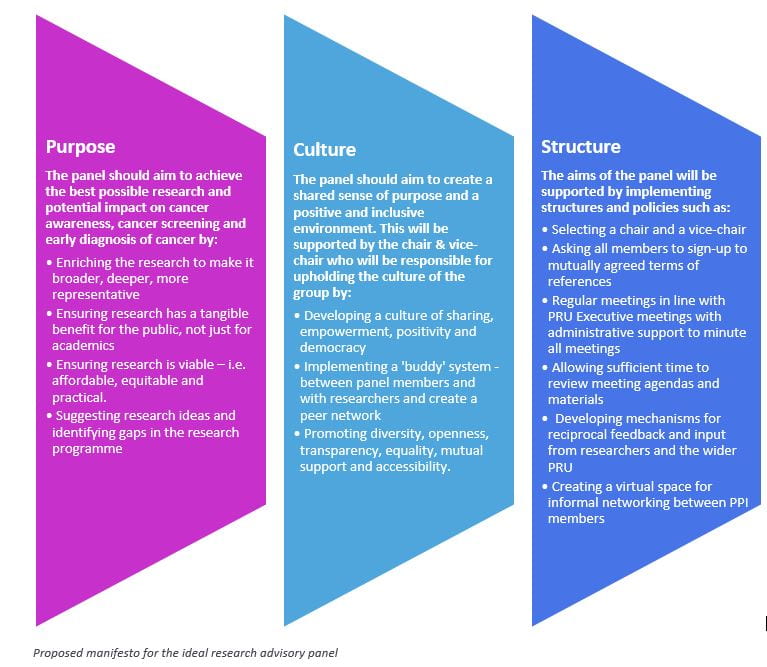What makes an ideal Patient and Public involvement (PPI) panel?
By guest blogger, on 5 September 2019
Authors: Aradhna Kaushal, John Isitt, Christian von Wagner, Douglas Lewins and Stephen Duffy
 The Policy Research Unit (PRU) in Cancer Awareness, Screening and Early Diagnosis recently set up a Research Advisory Panel to ensure that its research programme is relevant to and reflects the perspectives of patients and the public. In May, we ran a co-creation workshop designed to help the research advisory panel and PRU staff to build relationships with each other, to share ideas and experiences, to understand different perspectives, and to discover and prioritise discoveries together. The culmination of the workshop was the creation of a manifesto for the development of the Research Advisory Panel.
The Policy Research Unit (PRU) in Cancer Awareness, Screening and Early Diagnosis recently set up a Research Advisory Panel to ensure that its research programme is relevant to and reflects the perspectives of patients and the public. In May, we ran a co-creation workshop designed to help the research advisory panel and PRU staff to build relationships with each other, to share ideas and experiences, to understand different perspectives, and to discover and prioritise discoveries together. The culmination of the workshop was the creation of a manifesto for the development of the Research Advisory Panel.
What did we do?
On the 31st of May we ran a co-creation workshop bringing together newly appointed patient and public members, with academics and administrators – to co-create the Research Advisory Panel’s (RAP) purpose, structure and culture to answer the challenge:
“What would the ideal Research Advisory Panel look like? What should it be responsible for? What’s the best way to involve PPI members effectively with academics and administrators? And how should it be organised?”
Co-creation in healthcare research, sometimes referred to as co-production, is “an approach in which researchers, practitioners and the public work together, sharing power and responsibility from the start to the end of the project, including the generation of knowledge” (NIHR, 2018). This approach is important in healthcare research as those affected by research are in an ideal position to contribute to the design and delivery of research through their unique experiences and knowledge.
The group was made up of nine patient and public involvement (PPI) members, four academic staff from the Policy Research Unit in Cancer Awareness, Screening and Early Diagnosis (PRU), the administrator who supports the PRU, and the PRU’s director. Everyone participated equally in the workshop to co-create what an ideal Research Advisory Panel for the PRU would be like and how best to support and integrate PPI members.
What did we find?
In the first half of the workshop, recognising the differences in experience and diversity of the group, attention was given to create relationships, safety, permission and tools for sharing our personal experiences of PPI – the good, the bad and the ugly – and identified a range of attributes and obstacles to PPI in research. We discussed the importance of developing good relationships between PPI members, researchers and clinicians, and creating a positive environment for us to work together.
“As a new PPI member, you’re thrust into the midst of academics, physicians, etc and expected to make conversation over coffee. This can be a big obstacle for some people. They can be totally phased by the social demands.”
“Researchers tend to operate in cliques outside the meeting. [We] need to identify training for researchers to approach us as well as us approaching them.”
“If it really is about being a tick box, now I walk away. I’m not going to be complicit with that kind of game play. If I’m in the room, then accept me being in the room. You might not like everything that I say and that’s allowed, but please don’t have me here as a hologram.”
We then worked in small groups to create the future, writing manifestos for the ideal RAP in terms of purpose, culture and structure, which we presented back to the workshop. The main proposals are summarised below.
What happens next?
The insights from this workshop will be used to guide the future working relationships of the research advisory panel of the PRU. We are currently adopting the manifesto into our current terms of reference and way of working. We also have exciting plans ahead setting up a training and development plan for PPI members and virtual space where they can keep in touch with each other.
For anyone interested in running a similar workshop, please contact Partners in Creation.
 Close
Close



